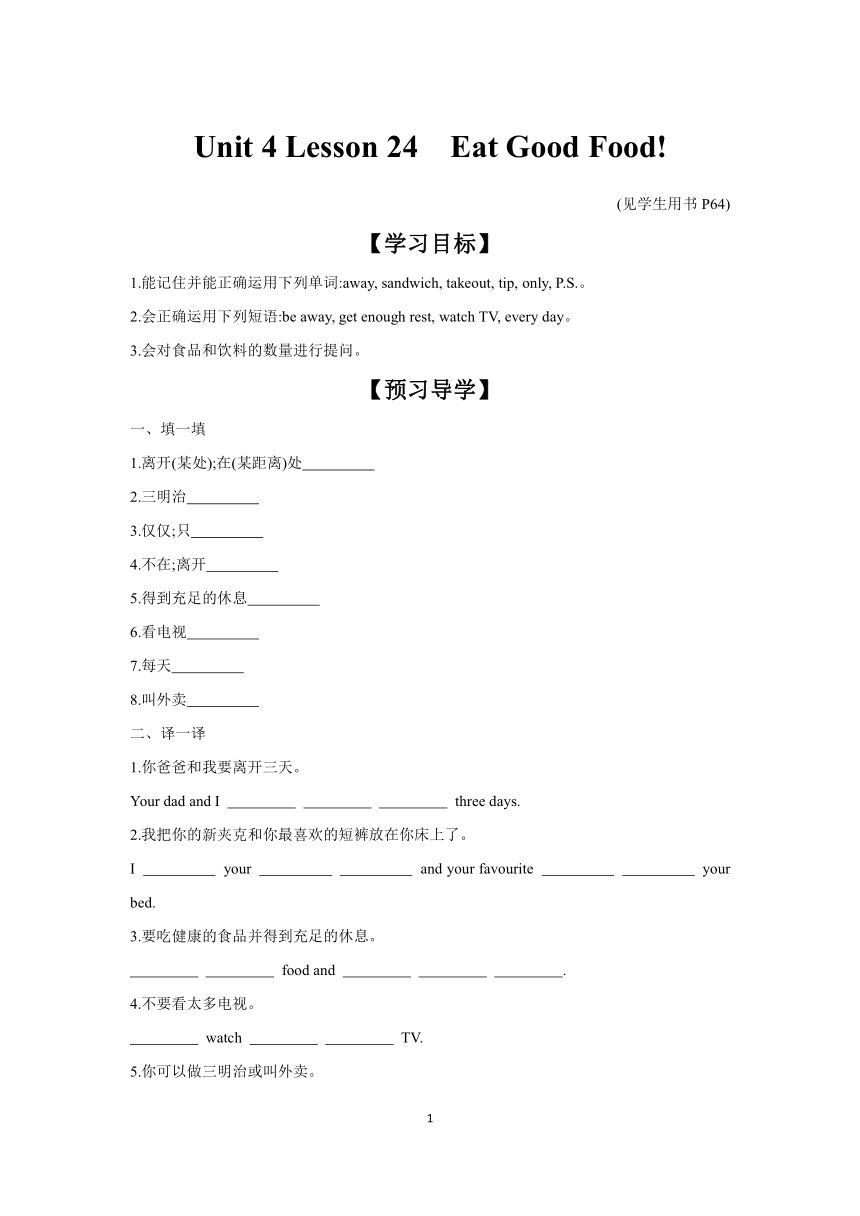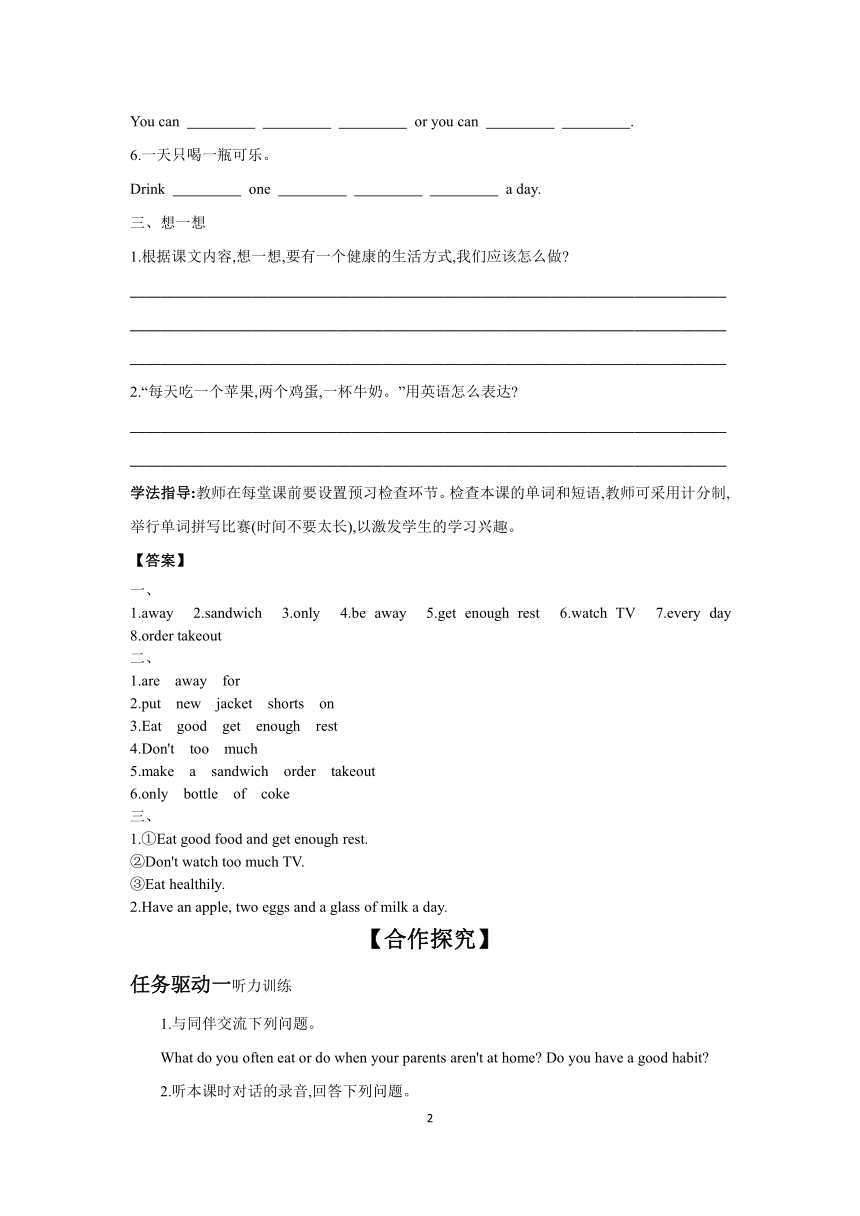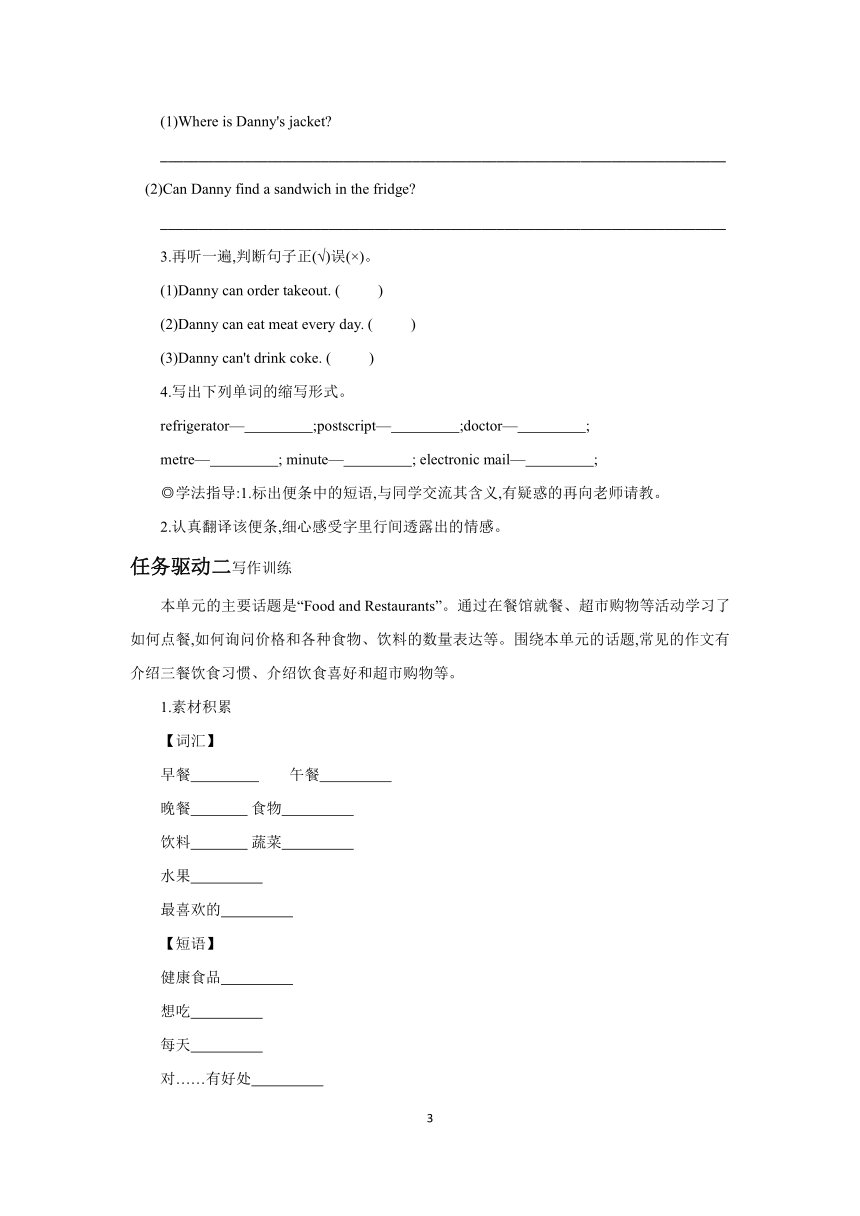冀教版七年级上册Unit 4 Lesson 24 Eat Good Food! 学案(含答案)
文档属性
| 名称 | 冀教版七年级上册Unit 4 Lesson 24 Eat Good Food! 学案(含答案) |

|
|
| 格式 | docx | ||
| 文件大小 | 27.5KB | ||
| 资源类型 | 教案 | ||
| 版本资源 | 冀教版 | ||
| 科目 | 英语 | ||
| 更新时间 | 2024-02-29 11:59:16 | ||
图片预览



文档简介
Unit 4 Lesson 24 Eat Good Food!
(见学生用书P64)
【学习目标】
1.能记住并能正确运用下列单词:away, sandwich, takeout, tip, only, P.S.。
2.会正确运用下列短语:be away, get enough rest, watch TV, every day。
3.会对食品和饮料的数量进行提问。
【预习导学】
一、填一填
1.离开(某处);在(某距离)处
2.三明治
3.仅仅;只
4.不在;离开
5.得到充足的休息
6.看电视
7.每天
8.叫外卖
二、译一译
1.你爸爸和我要离开三天。
Your dad and I three days.
2.我把你的新夹克和你最喜欢的短裤放在你床上了。
I your and your favourite your bed.
3.要吃健康的食品并得到充足的休息。
food and .
4.不要看太多电视。
watch TV.
5.你可以做三明治或叫外卖。
You can or you can .
6.一天只喝一瓶可乐。
Drink one a day.
三、想一想
1.根据课文内容,想一想,要有一个健康的生活方式,我们应该怎么做
__________________________________________________________________________________________________________________________________________________________________________________________________________________________________________2.“每天吃一个苹果,两个鸡蛋,一杯牛奶。”用英语怎么表达
____________________________________________________________________________________________________________________________________________________________学法指导:教师在每堂课前要设置预习检查环节。检查本课的单词和短语,教师可采用计分制,举行单词拼写比赛(时间不要太长),以激发学生的学习兴趣。
【答案】
一、
1.away 2.sandwich 3.only 4.be away 5.get enough rest 6.watch TV 7.every day 8.order takeout
二、
1.are away for
2.put new jacket shorts on
3.Eat good get enough rest
4.Don't too much
5.make a sandwich order takeout
6.only bottle of coke
三、
1.①Eat good food and get enough rest.
②Don't watch too much TV.
③Eat healthily.
2.Have an apple, two eggs and a glass of milk a day.
【合作探究】
任务驱动一听力训练
1.与同伴交流下列问题。
What do you often eat or do when your parents aren't at home Do you have a good habit
2.听本课时对话的录音,回答下列问题。
(1)Where is Danny's jacket
__________________________________________________________________________(2)Can Danny find a sandwich in the fridge
__________________________________________________________________________
3.再听一遍,判断句子正(√)误(×)。
(1)Danny can order takeout. ( )
(2)Danny can eat meat every day. ( )
(3)Danny can't drink coke. ( )
4.写出下列单词的缩写形式。
refrigerator— ;postscript— ;doctor— ;
metre— ; minute— ; electronic mail— ;
◎学法指导:1.标出便条中的短语,与同学交流其含义,有疑惑的再向老师请教。
2.认真翻译该便条,细心感受字里行间透露出的情感。
任务驱动二写作训练
本单元的主要话题是“Food and Restaurants”。通过在餐馆就餐、超市购物等活动学习了如何点餐,如何询问价格和各种食物、饮料的数量表达等。围绕本单元的话题,常见的作文有介绍三餐饮食习惯、介绍饮食喜好和超市购物等。
1.素材积累
【词汇】
早餐 午餐
晚餐 食物
饮料 蔬菜
水果
最喜欢的
【短语】
健康食品
想吃
每天
对……有好处
【开头句】
I'm... I eat lots of healthy food every day.
Hello, I want to tell you something about my eating habits today.
Different people like different food. I have a good eating habit.
【中间句】
I like...because...
I don't like...I think they are ...
My favourite food is...because it is good for my health.
I usually have/eat...for breakfast/lunch/supper.
My mother often asks me to eat...
It's important to eat/drink ...
【结尾句】
What's your favourite food Do you have a good eating habit
What food/vegetables/fruits do you like to eat/drink
2.写作指导
①根据写作要求,确定正确的人称。
②注意可数名词的单复数形式的变化。
③说出喜欢或不喜欢某种食物原因,使文章更丰富。
写作练习
◎学法指导:针对这种饮食习惯的写作,首先要在大脑中回忆掌握的食品词汇、表达喜好的句型等,组织构思好文章的基本思路之后再动笔。
健康的饮食习惯对我们很重要,你有什么样的饮食习惯呢 请根据下表内容,简单介绍你的饮食习惯。
要求:包括表格所有内容,可适当发挥,词数60左右。(开头和结尾已给出,不计入总词数)
Meals Likes Dislikes
Breakfast bread, milk, vegetables porridge
Lunch beef, rice, carrots juice
Supper apples, cabbage chocolate
Hello, everyone. I want to tell you something about my eating habits today.
What's your favourite food Can you tell me
【答案】
任务驱动一
2.(1)It's on his bed.
(2)No, he can't.
3.(1)√ (2)√ (3)×
4.fridge P.S. Dr.
m min email
任务驱动二
1.【词汇】
breakfast lunch dinner food drink vegetable fruit favourite
【短语】
healthy food would like to eat every day be good for
3.
Hello, everyone. I want to tell you something about my eating habits today. For breakfast, I have bread, milk and some vegetables. But I don't like porridge. I like rice with beef and carrots for lunch because they are healthy. I don't like juice. And for supper I like fruits and vegetables, such as apples and cabbages. Oh, I don't like chocolate for supper. It's bad for my teeth.
What's your favourite food Can you tell me
【知识超市】
[命题点一]too much的用法
1.作形容词时,用来修饰不可数名词,意为“太多”。例如:
—Would you like to go shopping with me
—I'd love to. But I have too much work to do.
2.作副词时,放在某些动词 (如talk, thank, disturb, walk, work等)后面或这些动词的宾语后面作状语,表示程度,意为“过分;太”。例如:
Jim eats too much. 吉姆吃太多了。
【拓展】
too many, too much与much too的用法
too many 作定语,意为“许多;太多”,后跟可数名词复数
too much 作定语,意为“许多;太多”,后跟不可数名词
much too 意为“太;非常”,用来修饰形容词或副词,不能用来修饰动词
对点自测
单项选择。
( )1.There are water on the ground.
A.too much B.much too C.too many D.many too
( )2.Don't eat cakes for supper.
A.too much B.much too C.too many D.many too
( )3.I'm tired. So I can't walk.
A.too much B.much too C.too many D.many too
[命题点二]Your dad and I are away for three days.你爸爸和我要离开三天。
be away意为“不在了;离开了”,后常跟for加一段时间作状语,表示“离开了多少时间”。be away后面可以跟from 表示“离开某地;不在那了”。例如:
Mr. White is away from Canada. 怀特先生不在加拿大了。
对点自测
根据汉语提示完成句子。
1.他没有离开家。
He from home.
2.杰克还是不在。
Jack is still .
【答案】
知识超市
命题点一
对点自测
1.A 2.C 3.B
命题点二
对点自测
1.isn't away
2.away
2
(见学生用书P64)
【学习目标】
1.能记住并能正确运用下列单词:away, sandwich, takeout, tip, only, P.S.。
2.会正确运用下列短语:be away, get enough rest, watch TV, every day。
3.会对食品和饮料的数量进行提问。
【预习导学】
一、填一填
1.离开(某处);在(某距离)处
2.三明治
3.仅仅;只
4.不在;离开
5.得到充足的休息
6.看电视
7.每天
8.叫外卖
二、译一译
1.你爸爸和我要离开三天。
Your dad and I three days.
2.我把你的新夹克和你最喜欢的短裤放在你床上了。
I your and your favourite your bed.
3.要吃健康的食品并得到充足的休息。
food and .
4.不要看太多电视。
watch TV.
5.你可以做三明治或叫外卖。
You can or you can .
6.一天只喝一瓶可乐。
Drink one a day.
三、想一想
1.根据课文内容,想一想,要有一个健康的生活方式,我们应该怎么做
__________________________________________________________________________________________________________________________________________________________________________________________________________________________________________2.“每天吃一个苹果,两个鸡蛋,一杯牛奶。”用英语怎么表达
____________________________________________________________________________________________________________________________________________________________学法指导:教师在每堂课前要设置预习检查环节。检查本课的单词和短语,教师可采用计分制,举行单词拼写比赛(时间不要太长),以激发学生的学习兴趣。
【答案】
一、
1.away 2.sandwich 3.only 4.be away 5.get enough rest 6.watch TV 7.every day 8.order takeout
二、
1.are away for
2.put new jacket shorts on
3.Eat good get enough rest
4.Don't too much
5.make a sandwich order takeout
6.only bottle of coke
三、
1.①Eat good food and get enough rest.
②Don't watch too much TV.
③Eat healthily.
2.Have an apple, two eggs and a glass of milk a day.
【合作探究】
任务驱动一听力训练
1.与同伴交流下列问题。
What do you often eat or do when your parents aren't at home Do you have a good habit
2.听本课时对话的录音,回答下列问题。
(1)Where is Danny's jacket
__________________________________________________________________________(2)Can Danny find a sandwich in the fridge
__________________________________________________________________________
3.再听一遍,判断句子正(√)误(×)。
(1)Danny can order takeout. ( )
(2)Danny can eat meat every day. ( )
(3)Danny can't drink coke. ( )
4.写出下列单词的缩写形式。
refrigerator— ;postscript— ;doctor— ;
metre— ; minute— ; electronic mail— ;
◎学法指导:1.标出便条中的短语,与同学交流其含义,有疑惑的再向老师请教。
2.认真翻译该便条,细心感受字里行间透露出的情感。
任务驱动二写作训练
本单元的主要话题是“Food and Restaurants”。通过在餐馆就餐、超市购物等活动学习了如何点餐,如何询问价格和各种食物、饮料的数量表达等。围绕本单元的话题,常见的作文有介绍三餐饮食习惯、介绍饮食喜好和超市购物等。
1.素材积累
【词汇】
早餐 午餐
晚餐 食物
饮料 蔬菜
水果
最喜欢的
【短语】
健康食品
想吃
每天
对……有好处
【开头句】
I'm... I eat lots of healthy food every day.
Hello, I want to tell you something about my eating habits today.
Different people like different food. I have a good eating habit.
【中间句】
I like...because...
I don't like...I think they are ...
My favourite food is...because it is good for my health.
I usually have/eat...for breakfast/lunch/supper.
My mother often asks me to eat...
It's important to eat/drink ...
【结尾句】
What's your favourite food Do you have a good eating habit
What food/vegetables/fruits do you like to eat/drink
2.写作指导
①根据写作要求,确定正确的人称。
②注意可数名词的单复数形式的变化。
③说出喜欢或不喜欢某种食物原因,使文章更丰富。
写作练习
◎学法指导:针对这种饮食习惯的写作,首先要在大脑中回忆掌握的食品词汇、表达喜好的句型等,组织构思好文章的基本思路之后再动笔。
健康的饮食习惯对我们很重要,你有什么样的饮食习惯呢 请根据下表内容,简单介绍你的饮食习惯。
要求:包括表格所有内容,可适当发挥,词数60左右。(开头和结尾已给出,不计入总词数)
Meals Likes Dislikes
Breakfast bread, milk, vegetables porridge
Lunch beef, rice, carrots juice
Supper apples, cabbage chocolate
Hello, everyone. I want to tell you something about my eating habits today.
What's your favourite food Can you tell me
【答案】
任务驱动一
2.(1)It's on his bed.
(2)No, he can't.
3.(1)√ (2)√ (3)×
4.fridge P.S. Dr.
m min email
任务驱动二
1.【词汇】
breakfast lunch dinner food drink vegetable fruit favourite
【短语】
healthy food would like to eat every day be good for
3.
Hello, everyone. I want to tell you something about my eating habits today. For breakfast, I have bread, milk and some vegetables. But I don't like porridge. I like rice with beef and carrots for lunch because they are healthy. I don't like juice. And for supper I like fruits and vegetables, such as apples and cabbages. Oh, I don't like chocolate for supper. It's bad for my teeth.
What's your favourite food Can you tell me
【知识超市】
[命题点一]too much的用法
1.作形容词时,用来修饰不可数名词,意为“太多”。例如:
—Would you like to go shopping with me
—I'd love to. But I have too much work to do.
2.作副词时,放在某些动词 (如talk, thank, disturb, walk, work等)后面或这些动词的宾语后面作状语,表示程度,意为“过分;太”。例如:
Jim eats too much. 吉姆吃太多了。
【拓展】
too many, too much与much too的用法
too many 作定语,意为“许多;太多”,后跟可数名词复数
too much 作定语,意为“许多;太多”,后跟不可数名词
much too 意为“太;非常”,用来修饰形容词或副词,不能用来修饰动词
对点自测
单项选择。
( )1.There are water on the ground.
A.too much B.much too C.too many D.many too
( )2.Don't eat cakes for supper.
A.too much B.much too C.too many D.many too
( )3.I'm tired. So I can't walk.
A.too much B.much too C.too many D.many too
[命题点二]Your dad and I are away for three days.你爸爸和我要离开三天。
be away意为“不在了;离开了”,后常跟for加一段时间作状语,表示“离开了多少时间”。be away后面可以跟from 表示“离开某地;不在那了”。例如:
Mr. White is away from Canada. 怀特先生不在加拿大了。
对点自测
根据汉语提示完成句子。
1.他没有离开家。
He from home.
2.杰克还是不在。
Jack is still .
【答案】
知识超市
命题点一
对点自测
1.A 2.C 3.B
命题点二
对点自测
1.isn't away
2.away
2
同课章节目录
- Unit 1 School and friends
- Lesson 1 Hello!
- Lesson 2 Teacher and Students
- Lesson 3 Welcome to Our School
- Lesson 4 What Is It?
- Lesson 5 May I Have a Book?
- Lesson 6 Things for School
- Unit 2 Colours and Clothes
- Lesson 7 Jenny's New Skirt
- Lesson 8 Danny's Favourit Colou
- Lesson 9 Whose Coat Is This?
- Lesson 10 Clothes for a Cold Day
- Lesson 11 Clothes around the World
- Lesson 12 Let's Go Shopping!
- Unit 3 Body Parts and Feelings
- Lesson 13 Body Parts
- Lesson 14 Colours and Feelings
- Lesson 15 Tall or Short
- Lesson 16 Happy or Sad
- Lesson 17 Seeing a Docto
- Lesson 18 We All Look Different!
- Unit 4 Food and Restaurants
- Lesson 19 Time for Breakfast!
- Lesson 20 I Like the Supermarket!
- Lesson 21 At the Market
- Lesson 22 In the Restaurant
- Lesson 23 The Corner Store
- Lesson 24 Eat Good Food!
- Unit 5 Family and Home
- Lesson 25 Jenny's Family
- Lesson 26 Li Ming's Family
- Lesson 27 Danny at Home
- Lesson 28 A Family Picnic
- Lesson 29 A Birthday Card
- Lesson 30 Grandma's Birthday Party
- Unit 6 Let's Go!
- Lesson 31 Let's Go to the Bookstore!
- Lesson 32 At the Supermarket
- Lesson 33 Let's Go to the Zoo!
- Lesson 34 On the Farm
- Lesson 35 Let's Go to the Museum!
- Lesson 36 Let's Go to the Movie Theatre!
- Unit 7 Days and Months
- Lesson 37 Seasons and Weathe
- Lesson 38 Nick's Busy Month
- Lesson 39 A Class Calenda
- Lesson 40 When Is Your Birthday?
- Lesson 41 Holidays
- Lesson 42 Happy Holidays!
- Unit 8 Countries around the world
- Lesson 43 Directions
- Lesson 44 Jack's Goodbye Party
- Lesson 45 China
- Lesson 46 Canada and the U.S.
- Lesson 47 The U.K. and Australia
- Lesson 48 English-Speaking Countries
